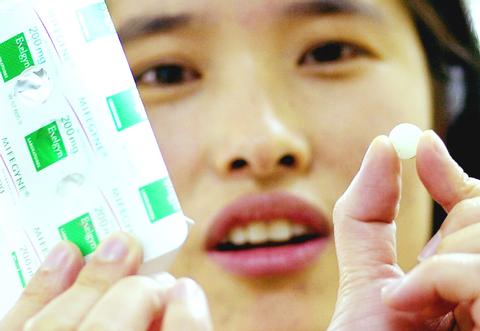Taiwan's Department of Health (DOH,
DOH director-general Lee Ming-liang (李明亮) yesterday said that the pill was approved to prevent women from taking the drug on their own, risking excessive bleeding and other dangers.

PHOTO: LIN CHENG-KUNG, TAIPEI TIMES
According to Lee, thousands of Taiwanese women, most of them teenagers, have illegally obtained the pill from drug stores or the Internet. "Legalizing the drug offered women an alternative form of abortion," Lee said, "and urged doctors to abide by the regulations."
According to DOH regulations, the French-imported RU-486 pill, called Mifepristone (
Meanwhile, patients would be required to have a medical checkup 36 to 48 hours after taking the pill, during which they would have to take a second drug which causes the uterus to expel the embryo.
"Medical supervision is necessary to ensure safe use of the drug," Lee said. Two Taiwan women died and about 1,000 were treated for side-effects from using the drug last year.
In Asia, only Taiwan and China have approved use of RU-486.
According to the DOH, companies involved in the import and distribution of RU-486 must register with authorities. The pill, which was first introduced in France 12 years ago, has been available on Taiwan's black market for several years, and recently on the Internet where the three initial pills cost between NT$4,800 to NT$6,000, local media said.
The pill only costs about NT$500 in a public hospital.
The government has yet to say what steps it will take to prevent illegal sales of the drug. Meanwhile, Lai Shu-mei (賴淑美), head of the Bureau of National Health Insurance (中央健保局), said yesterday the government will pay NT$1,500 for each patient who takes the pill on a doctor's prescription.
More than 42,000 abortions were performed under the national health program last year. However, Secretary-general of the Obstetrics and Gynecology Association Su Tsung-hsien (

FALSE DOCUMENTS? Actor William Liao said he was ‘voluntarily cooperating’ with police after a suspect was accused of helping to produce false medical certificates Police yesterday questioned at least six entertainers amid allegations of evasion of compulsory military service, with Lee Chuan (李銓), a member of boy band Choc7 (超克7), and actor Daniel Chen (陳大天) among those summoned. The New Taipei City District Prosecutors’ Office in January launched an investigation into a group that was allegedly helping men dodge compulsory military service using falsified medical documents. Actor Darren Wang (王大陸) has been accused of being one of the group’s clients. As the investigation expanded, investigators at New Taipei City’s Yonghe Precinct said that other entertainers commissioned the group to obtain false documents. The main suspect, a man surnamed

DEMOGRAPHICS: Robotics is the most promising answer to looming labor woes, the long-term care system and national contingency response, an official said Taiwan is to launch a five-year plan to boost the robotics industry in a bid to address labor shortages stemming from a declining and aging population, the Executive Yuan said yesterday. The government approved the initiative, dubbed the Smart Robotics Industry Promotion Plan, via executive order, senior officials told a post-Cabinet meeting news conference in Taipei. Taiwan’s population decline would strain the economy and the nation’s ability to care for vulnerable and elderly people, said Peter Hong (洪樂文), who heads the National Science and Technology Council’s (NSTC) Department of Engineering and Technologies. Projections show that the proportion of Taiwanese 65 or older would

Democracies must remain united in the face of a shifting geopolitical landscape, former president Tsai Ing-wen (蔡英文) told the Copenhagen Democracy Summit on Tuesday, while emphasizing the importance of Taiwan’s security to the world. “Taiwan’s security is essential to regional stability and to defending democratic values amid mounting authoritarianism,” Tsai said at the annual forum in the Danish capital. Noting a “new geopolitical landscape” in which global trade and security face “uncertainty and unpredictability,” Tsai said that democracies must remain united and be more committed to building up resilience together in the face of challenges. Resilience “allows us to absorb shocks, adapt under

Taiwan Semiconductor Manufacturing Co (TSMC, 台積電) yesterday said it is building nine new advanced wafer manufacturing and packaging factories this year, accelerating its expansion amid strong demand for high-performance computing (HPC) and artificial intelligence (AI) applications. The chipmaker built on average five factories per year from 2021 to last year and three from 2017 to 2020, TSMC vice president of advanced technology and mask engineering T.S. Chang (張宗生) said at the company’s annual technology symposium in Hsinchu City. “We are quickening our pace even faster in 2025. We plan to build nine new factories, including eight wafer fabrication plants and one advanced